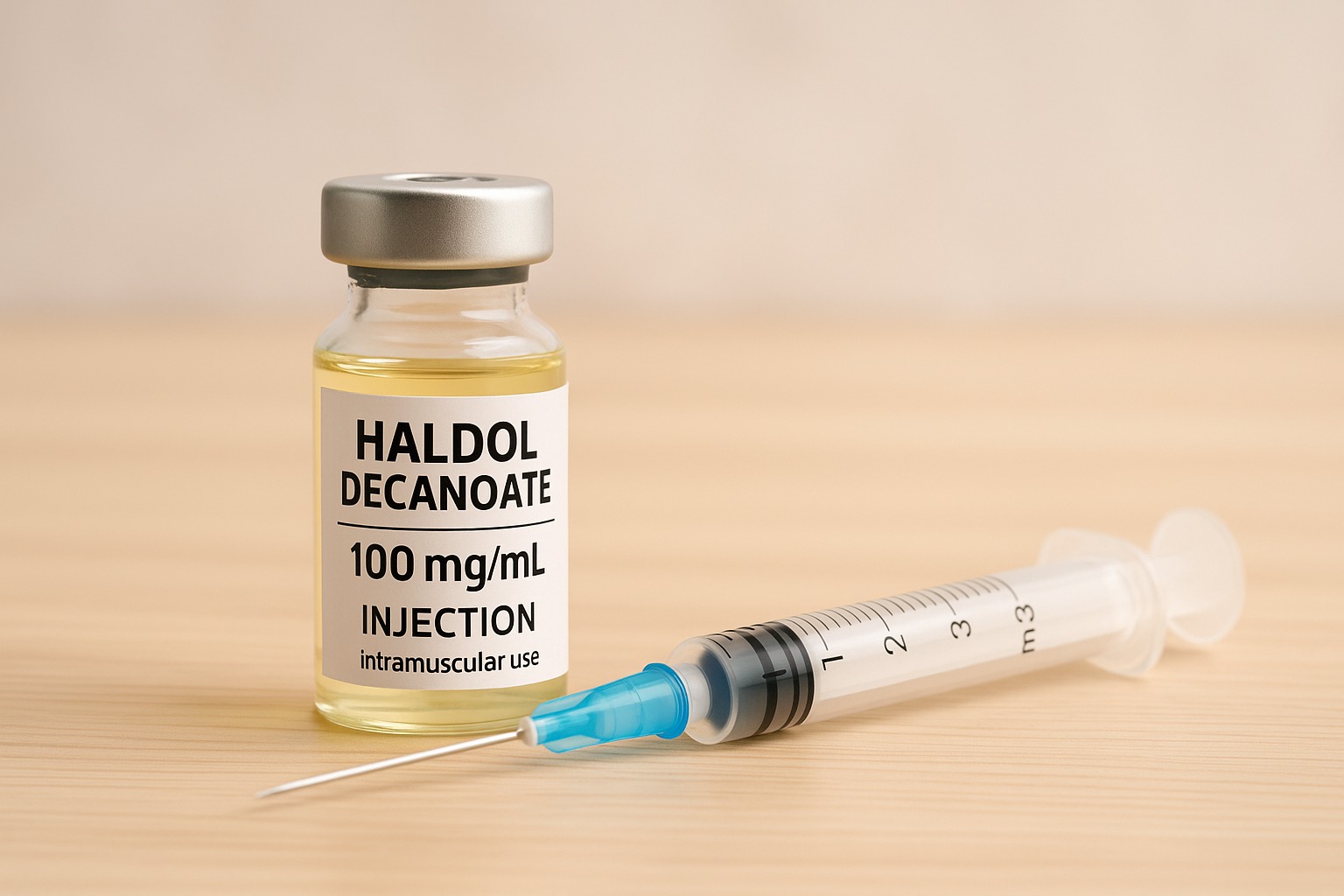Haldol Decanoate is a prescription medication designed to support people living with certain mental health conditions. Its active ingredient, haloperidol decanoate, is a long-acting antipsychotic from the butyrophenone class. Doctors often prescribe it to help manage schizophrenia, schizoaffective disorder, and related conditions that require consistent symptom control. Unlike oral haloperidol, Haldol Decanoate is given as an intramuscular (IM) injection that works slowly over time, making it a trusted choice for patients who benefit from steady treatment.
In this clear, patient-friendly guide, you’ll learn what Haldol Decanoate is, how it works, how it’s used, possible side effects, safety tips, and answers to the most-searched questions about this medication.
Quick disclaimer: This article is for educational purposes only and should not replace professional medical advice. Always follow your doctor’s instructions and treatment plan.
What Is Haldol Decanoate?
Haldol Decanoate is the long-acting injectable form of haloperidol. It belongs to the group of drugs known as typical antipsychotics (also called first-generation antipsychotics).
- Form: Haldol Decanoate is supplied as a solution (usually 50 mg/mL or 100 mg/mL) for intramuscular injection.
- How it works: Haloperidol blocks dopamine receptors in the brain. This helps rebalance neurotransmitters, reducing symptoms like hallucinations, delusions, agitation, and disorganized thinking.
Because it’s given as a depot injection, the medication is slowly released into the bloodstream, providing continuous treatment for several weeks.
How Does Haldol Decanoate Work?
Dopamine plays an important role in thought, mood, and behavior. In some psychiatric conditions, dopamine activity becomes overactive, leading to symptoms such as paranoia, aggression, or psychosis.
Haldol Decanoate:
- Blocks dopamine receptors (D2 receptors) to calm overactivity in the brain.
- Provides steady symptom control since the long-acting formulation avoids daily pill intake.
- Supports treatment adherence for patients who may have difficulty remembering or sticking to oral medication schedules.
Common Uses of Haldol Decanoate
Doctors prescribe Haldol Decanoate for:
- Schizophrenia – to manage chronic symptoms and reduce relapse risk.
- Schizoaffective disorder – when psychotic features are present.
- Other psychotic disorders – where long-term antipsychotic treatment is needed.
- Patients requiring maintenance therapy – especially when oral haloperidol has been effective but adherence is challenging.
Dosage and Administration
The dosing of Haldol Decanoate is individualized. Your doctor will decide the right dose and frequency for you.
- Typical frequency: Once every 4 weeks, though some patients may need injections every 3 weeks.
- Starting dose: Often based on the previous oral haloperidol dose. Doctors usually begin with 10–20 times the daily oral dose, not exceeding 100 mg in a single injection.
- Administration: Injected into the muscle (buttock or thigh) by a healthcare professional. It should not be given intravenously.
What to expect on injection day:
- You’ll check in with your healthcare provider, who will confirm your dose.
- The injection is quick, usually followed by observation for any immediate side effects.
- The medicine releases slowly, providing lasting effects until your next appointment.
Side Effects of Haldol Decanoate
Like all medications, Haldol Decanoate may cause side effects. Some are mild and temporary, while others need medical attention.
Common side effects:
- Drowsiness or fatigue
- Restlessness or muscle stiffness
- Dry mouth
- Weight changes
Serious but less common side effects:
- Extrapyramidal symptoms (EPS): muscle rigidity, tremors, or involuntary movements
- Tardive dyskinesia: involuntary repetitive movements (risk increases with long-term use)
- Neuroleptic malignant syndrome (rare): fever, stiff muscles, confusion (medical emergency)
- Heart rhythm changes: QT prolongation, irregular heartbeat
Always report new or worsening symptoms to your healthcare team right away.
Warnings and Precautions
- Older adults with dementia-related psychosis: Haldol Decanoate carries a boxed warning for increased risk of death.
- Pregnancy and breastfeeding: Use only if the benefits outweigh the risks.
- Medical history: Inform your doctor if you have heart disease, seizures, liver problems, or a history of movement disorders.
- Drug interactions: Other medications (antidepressants, certain antibiotics, or drugs affecting heart rhythm) may interact with haloperidol. Always share your full medication list.
Cost and Access
Haldol Decanoate is available only by prescription. The cost may vary depending on dose, region, and insurance coverage. Generic versions are often more affordable. Many patients receive their injections at clinics or mental health centers, which may also provide financial support programs.
Frequently Asked Questions (FAQs)
Q1. How often do I need Haldol Decanoate injections?
Most patients receive an injection every 4 weeks, but your doctor may adjust the schedule to every 3 weeks if needed.
Q2. Is Haldol Decanoate the same as oral haloperidol?
Yes, both contain haloperidol. However, the decanoate form is long-acting and injected, while oral haloperidol is taken daily.
Q3. Can Haldol Decanoate cure schizophrenia?
No. It does not cure schizophrenia but helps manage symptoms and reduce relapses when used consistently.
Q4. What should I do if I miss an injection?
Contact your healthcare provider as soon as possible. Do not try to “catch up” without medical advice.
Q5. Is it safe to drink alcohol while on Haldol Decanoate?
Alcohol can increase drowsiness and impair judgment when combined with haloperidol. It’s best to avoid or limit alcohol.
Final Thoughts
Haldol Decanoate is a proven long-acting treatment option for schizophrenia and related conditions. By providing steady symptom control and improving treatment adherence, it helps many patients maintain stability and reduce relapse risks.
If you or someone you know is prescribed Haldol Decanoate, staying consistent with appointments, reporting side effects early, and working closely with your healthcare team are key steps toward better mental health management.


Leave a Comment